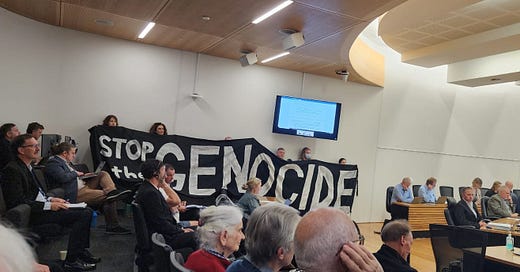First NZ city votes to sanction firms linked to illegal Israeli settlements
Christchurch City Council changes its procurement policy in a victory for the country's Boycott, Divestment and Sanctions Movement.

Palestine campaigners in New Zealand are celebrating after Christchurch became the first city in the country to sanction firms doing business within illegal Israeli settlements.
The move by Christchurch City Council follows a similar vote by regional council Environment Canterbury (ECan) earlier this year.
Christchurch is the largest city in the Pacific nation’s South Island and over the past year has been the scene of some of the most direct demonstrations to end Israel’s genocidal onslaught in Gaza, its de facto annexation of Palestinian land and its system of apartheid.
In June, the Palestine Solidarity Network Aotearoa (PSNA) requested the council cease doing business with any firms listed by the United Nations Human Rights Council (UNHRC) as being involved in the building or maintenance of illegal Israeli settlements on occupied Palestinian land.
A decision by councillors to pass the motion to change the council’s procurement policy was passed with three abstentions and two councillors against, much to the delight of Palestine activists in the public gallery.
“Today Israel is running riot across the Middle East because it has never been held to account for 76 years of flagrant breaches of international law,” PSNA chairman John Minto said afterwards.
“The motion passed by Christchurch City today helps to end Israeli impunity for war crimes. Building settlements on occupied land belonging to others is a war crime under international law.
“The motion is a small but significant step in sanctioning Israel. Many more steps must follow”.
An internal council report, which had sought advice from the Ministry of Foreign Affairs and Trade (MFAT), found the request in line from UNSC Resolution 2334, stating Israel’s settlements illegal under international law.
The Office of the Auditor-General, which was also contacted by the council over the matter, observed that the policy decision was for the council to make and that public sector organisations should procure their goods and services ethically.
Minto addressed the council’s Finance and Performance Committee meeting on Wednesday, alongside Canterbury University lecturer Josephine Varghese, with opposing contributions coming from several Zionists, including the NZ Jewish Council’s Ben Kepes. Kepes said the move would be perceived as “politically motivated”.
The PSNA had also requested that Christchurch City Council compel its controlled trading company Lyttleton Port to withdraw its facilities to Israeli cargo shipping company ZIM. This was rejected on the basis the port had an independent board of directors responsible for its governance.

“The separation of LPC’s operational activities from the Council as its ultimate shareholder means there is limited ability for the Council to instruct LPC on how it should manage its operations,” the council’s report read.
Varghese told In Context the vote was a sign of the mood of the public and it was hoped the government would respond it to.
“People want the industrial-scale slaughter of tens of thousands of women, children, elders to end,” she said.
“The Ministry of Foreign Affairs and Trade (MFAT) is beholden by the interests of the wealthy minority in Aotearoa, but we hope it follows suit and reviews its procurement policies in line with its stated commitments to international law and human rights.”
New Zealand – part of the Western Five Eyes security apparatus and now firmly aligned with US foreign policy settings – has refused to divest from Israel or illegal Israeli settlements in the West Bank and East Jerusalem.
It has also refused to support South Africa’s application before the International Court of Justice (ICJ) accusing Israel of breaching the genocide Convention.
New Zealand military staff have been involved in targeting sites in Yemen in a US-led bombing campaign in response to Houthi attacks on cargo ships breaking its Red Sea blockade, a direct action to stop genocide from taking place in Gaza.
However, the council victory follows a series of other moves in civil society to divest.
Last month, Victoria University of Wellington (VUW) Foundation announced it was divesting from all Israeli government bonds and shares of companies listed in Israel. The Foundation had previously reported having close to $50,000 invested in Israeli government bonds. It followed direct action by Student Justice for Palestine Pōneke (SJPP) and others.
The BDS movement is growing across the world, particularly following the ICJ opinion released in July which stated countries must take active measures to end Israel’s illegal occupation.
Irish Taoiseach (Prime Minister) Simon Harris last week said his government would finally move to enact into law the Occupied Territories Bill, which would ban trade between Ireland and Israel's illegal settlements on Palestinian land.
The government had stalled on the move since 2018, when it was overwhelmingly supported in the lower and upper houses of Parliament, on the pretext trade was an EU competency matter. However, the country’s Attorney General said this week there may be a "legal pathway forward" to introduce a law in light of the ICJ Advisory Opinion.




That is a good example for other cities in Aotearoa to follow. The mood of the public is very much at odds with the actions and positions of the New Zealand government on the Gaza genocide, so it is clear that democracy is not working at the national level. Perhaps there can be a breakthrough at the local level.
Totally support these moves not before time I wish we'd kept our foreign policy independent.